Twelve unique biblical profiles reveal the diverse motivations and methods of giving, inspiring you on your journey of generosity.
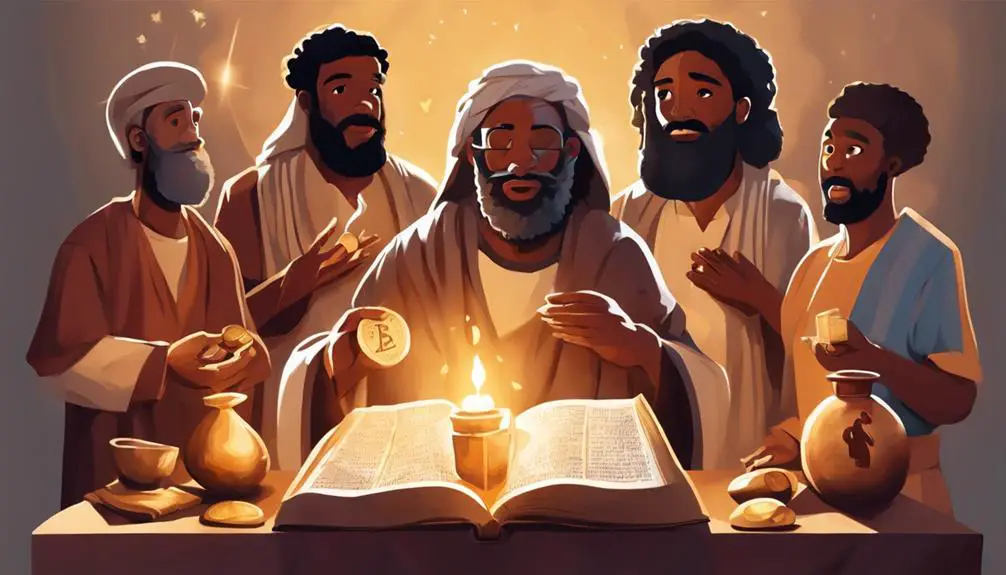
12 Types of Givers in the Bible
Just as there are many hues in a sunset, there are 12 distinct types of givers in the Bible, each with their unique traits and motivations.
You're familiar with notable figures like Abraham, the Faithful Giver, or Jacob, the Vow Maker, but have you considered the lesser-known givers such as Barnabas, the Encourager, or the Macedonian Church, the Joyful Givers?
Each character provides invaluable insights into the act of giving, painting a vibrant panorama of generosity. Curious about the rest? We'll unpack these diverse profiles of biblical givers, waiting to inspire you on your own giving journey.
Key Takeaways
- Givers in the Bible, like Abraham and Jacob, demonstrated faithfulness and trust in God through their acts of generosity.
- Biblical figures such as Joseph and Moses exemplify the role of stewardship and moral guidance in generous giving.
- King David's generosity contributed to nation-building, showing the potential impact of giving on societal structures.
- The Bible teaches giving not only in terms of physical gifts, but also in terms of commitment, obedience, and providence.
Abraham: The Faithful Giver
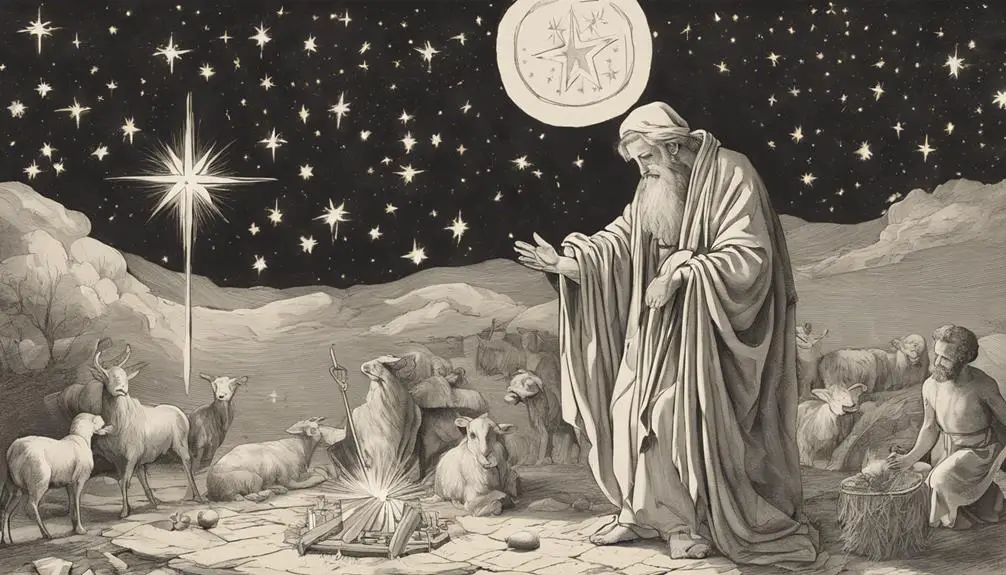
Who among the biblical figures exemplifies a giver more than Abraham, a man whose faithfulness led him to offer even his own son? The narrative of Abraham is an apt embodiment of 'Faith and Generosity', two concepts intricately woven into his story.
Abraham's story isn't just about physical or material giving; it's about a mental and spiritual giving that transcends earthly possessions. It's about a man's willingness to yield his most treasured possession, his son Isaac, in obedience to God's command. This act has left 'Abraham's Giving Legacy' as an enduring testament to his faith.
When you delve into the details, Abraham's generosity wasn't impulsive; it was rooted in faith. His faith led him to believe that God's promises were true, even when physical circumstances seemed to contradict them. This faith, in turn, fueled his generosity, for he trusted God's provision.
Abraham's story challenges you to question: what're you holding back from God? It asks you to examine your faith and generosity. Ultimately, Abraham's giving legacy isn't about what he gave away, but about the faith that moved him to give. That's the essence of his narrative and the heart of his legacy.
Jacob: The Vow Maker
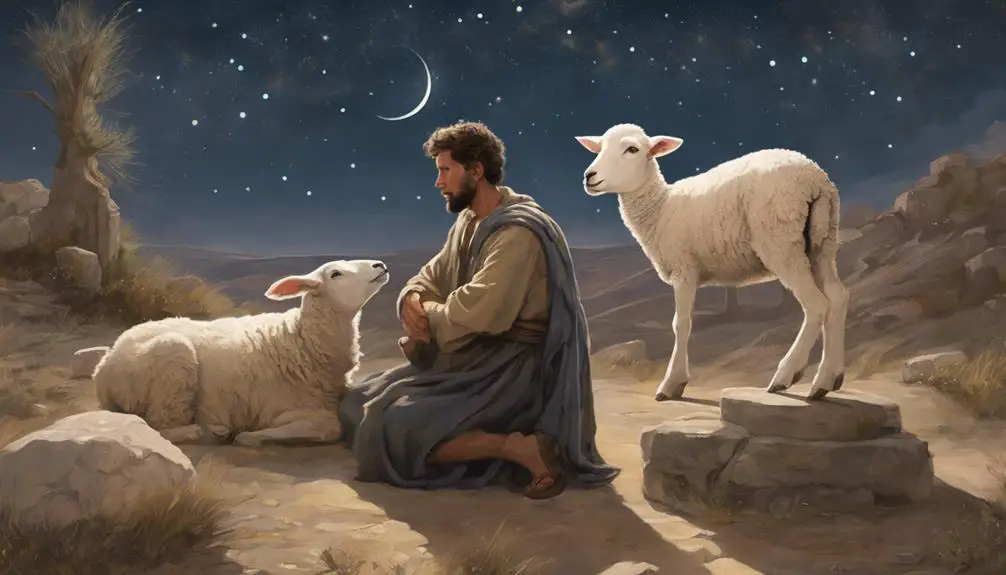
While Abraham's story of faith and giving is deeply moving, let's turn our attention to Jacob, another powerful example of a giver in the Bible known for his solemn vows. Jacob was an ambitious man, whose actions were guided by the vows he made.
Jacob's Generosity Impact is seen throughout the Bible, particularly in the way he promised God a tenth of all he'd if God would provide for him (Genesis 28:20-22). This commitment, his vow, not only defined his character but also set a precedent for giving within the Judeo-Christian tradition.
The Vow Making Significance in Jacob's story isn't just about the tangible offerings he made. It's about the intention behind the vow. Jacob's vow was a response to God's promise of protection and provision. His vow was an act of trust, demonstrating his faith in God's promise.
In essence, Jacob's vows weren't just duties or obligations. They were acts of gratitude and faith, and they were his way of giving back to God. His story teaches us that giving isn't always about physical gifts. It's also about giving our trust, our commitment, and our gratitude.
Joseph: The Provider
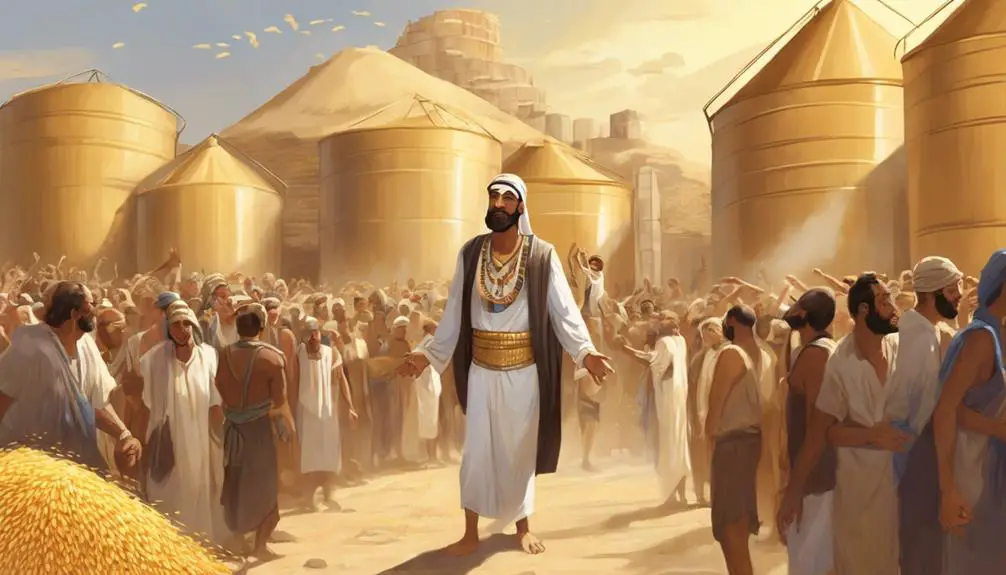
Have you ever considered the profound impact Joseph, another significant giver in the Bible, had as a provider? Joseph's stewardship lessons carry a great weight of wisdom. He was a visionary provider who understood the importance of preparation and foresight. This was evident when he interpreted Pharaoh's dream, predicting seven years of abundance followed by seven years of famine.
Joseph's strategies for dealing with this predicted crisis show his remarkable management and leadership skills. He didn't just predict the famine; he planned for it. He stored up grain during the years of abundance to provide for the years of famine. His proactive steps saved not just Egypt, but surrounding nations as well.
Through Joseph's actions, we witness the impact of providence. Providence is God's divine intervention in the universe, and Joseph's life is a testament to this. Despite being sold into slavery by his brothers, he rose to become the second most powerful man in Egypt, saving many lives.
From Joseph, we learn that stewardship isn't just about managing resources. It's about understanding the times, predicting needs, and planning ahead. It's about being a provider for others in times of need, a lesson that remains relevant today.
Moses: The Law Giver

Moving from one powerful biblical figure to another, you're now invited to consider Moses, a man renowned for his role as a law giver. Moses' leadership style, marked by humility and obedience, stood out in a significant way. He wasn't just a leader by name, but by action, leading the Israelites out of Egyptian bondage and into the wilderness.
Analyzing the impact of Mosaic laws, you'll realize they were more than a set of rules. They shaped the moral, social, and religious fabric of the Israelite community. From the Ten Commandments to laws about sacrifices, purity, and even dietary habits, Moses' laws provided a comprehensive guide for righteous living.
Moses' laws were unique in that they were directly communicated by God. This divine origin gave the laws a degree of authority and sacredness unmatched by any human-made legal system. They weren't mere civic laws, but divine instructions, governing not only actions but also attitudes and intentions.
David: The Kingdom Builder
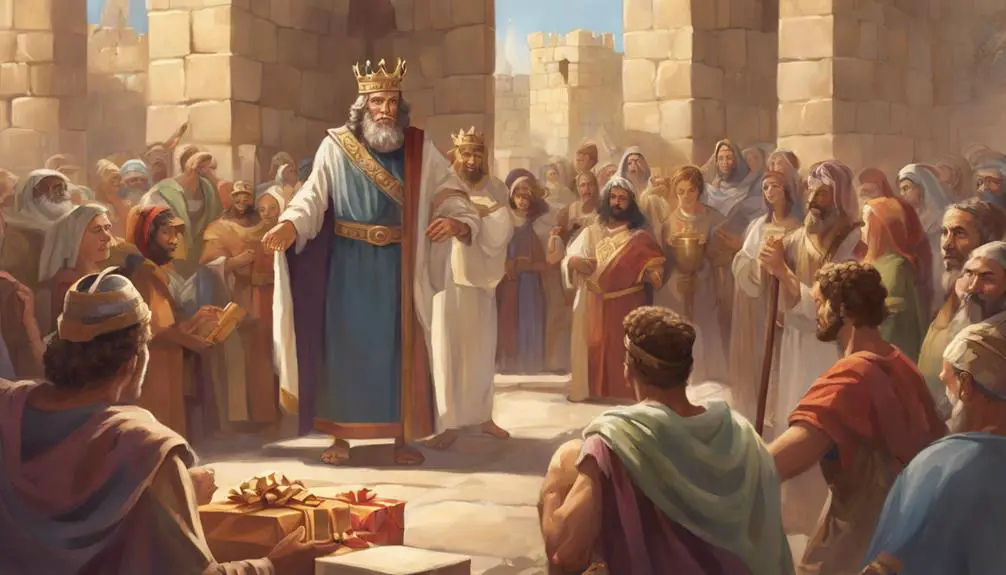
Shifting the spotlight to David, the shepherd boy turned king, you'll find a figure whose actions were instrumental in establishing a united and robust kingdom in Israel. David's generosity wasn't confined to his material wealth but extended to his strategic vision for kingdom building.
You see, David understood that a kingdom isn't made robust solely through military might or wealth accumulation. Instead, it requires a leader who freely gives of himself—his time, energy, wisdom, and resources—for the good of his people. This is precisely what David did.
He generously devoted his leadership skills to unite the tribes of Israel, a monumental task that required tact, diplomacy, and immense generosity of spirit. He also used his personal resources to help build the nation, providing for the needs of his people, and establishing a stable government.
David's generosity also manifested in his respect for the religious traditions of his people. He brought the Ark of the Covenant to Jerusalem, signifying the unity of religious and political power. By doing so, he laid a solid foundation for the nation, setting the stage for the next generation of leaders, like Solomon, to build upon.
Solomon: The Temple Benefactor
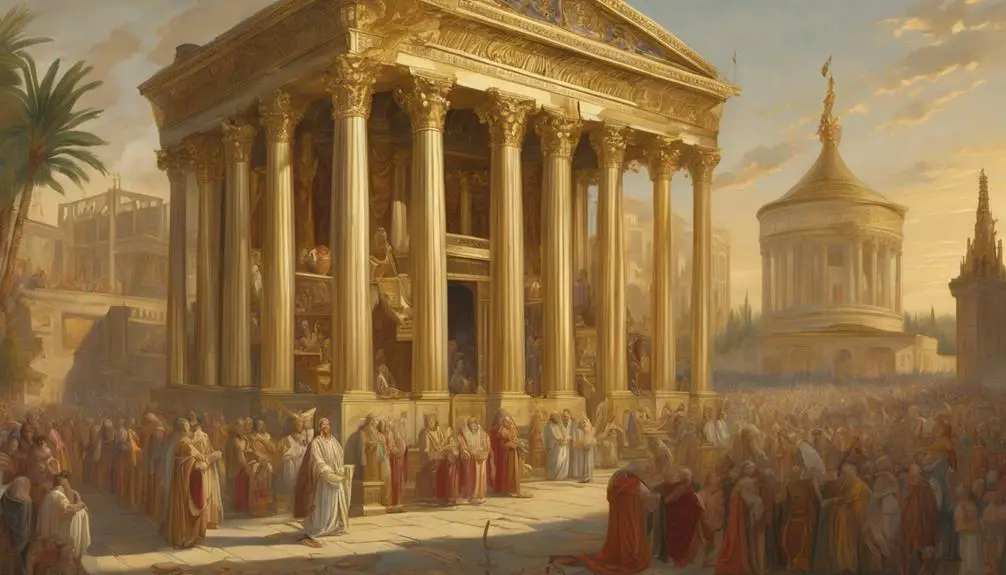
Next in line comes Solomon, David's successor and a key figure in biblical philanthropy, renowned for his monumental contribution to building the first Jewish temple. His legacy is often linked with Solomon's wisdom, an attribute that guided his reign and his generous acts. He's particularly remembered for the Temple's significance, both as a house of worship and a symbol of spiritual unity.
Solomon's contribution wasn't merely financial; it was a profound investment in his community's spiritual future. His wisdom guided the complex construction and intricate design of the temple, reflecting the divine wisdom that was bestowed upon him.
Let's delve deeper into Solomon's contributions:
Aspect |
Contribution |
|---|---|
Monetary |
Funded the building of the temple |
Spiritual |
Established the temple as a spiritual cornerstone |
Cultural |
Cemented Jewish identity and unity |
Historical |
Left an enduring legacy in biblical history |
Solomon, as a temple benefactor, provides an excellent example of a giver whose contribution surpasses material wealth. His wisdom and vision didn't just build a physical structure, it built a lasting spiritual legacy. This aspect of his giving offers a valuable lesson in understanding the multifaceted nature of giving. You're not just giving something; you're sowing into a future.
The Poor Widow: The Sacrificial Giver

Turning our attention to the Poor Widow, she exemplifies the sacrificial giver in the Bible, a figure whose humble offering stands as a profound testament to the power of selfless charity. The Widow's Mite Interpretation illustrates her contribution as a remarkable act of faith and sacrifice. Her story isn't simply about monetary donation but rather the spirit in which the gift is given.
To fully grasp the Sacrificial Giving Impact, consider these four aspects:
- The widow didn't give out of her surplus wealth, but from her poverty, demonstrating a willingness to sacrifice her limited resources for the greater good.
- Her gift was small in material terms yet immense in spiritual value, showcasing the principle that it's not the size of the gift that matters, but the heart behind it.
- Despite her financial situation, she gave everything she had, underlining the depth of her faith and trust in God.
- This act of giving, though it might appear insignificant to some, was acknowledged and praised by Jesus, indicating that God appreciates our sacrifices, no matter how small they may seem.
The Poor Widow's sacrificial giving is a compelling testament to the transformative power of selfless charity.
Mary Magdalene: The Devoted Giver

Drawing a parallel from the Poor Widow's sacrificial giving, let's now examine another inspiring example, Mary Magdalene, whose devotion to her faith made her a notable giver in the biblical narrative. Magdalene's Devotion is a remarkable pattern of giving, which is a reflection of her unwavering commitment to her faith.
As one of the prominent Women in the Bible, Mary Magdalene's generosity wasn't limited to material offerings. She gave her time, her loyalty, and above all, her heart. She stood by Jesus during his crucifixion, a testament to her steadfast loyalty. She was also the first to visit his tomb, demonstrating her commitment to honoring his memory.
Furthermore, her generous spirit didn't diminish even in the face of societal prejudice. Mary Magdalene, once a marginalized figure, transformed her life through her faith, and in turn, became a beacon of hope for many. Her giving nature was an outpouring of her devotion, proving that one's dedication to faith can transform giving into a profound expression of love.
Zacchaeus: The Repentant Giver
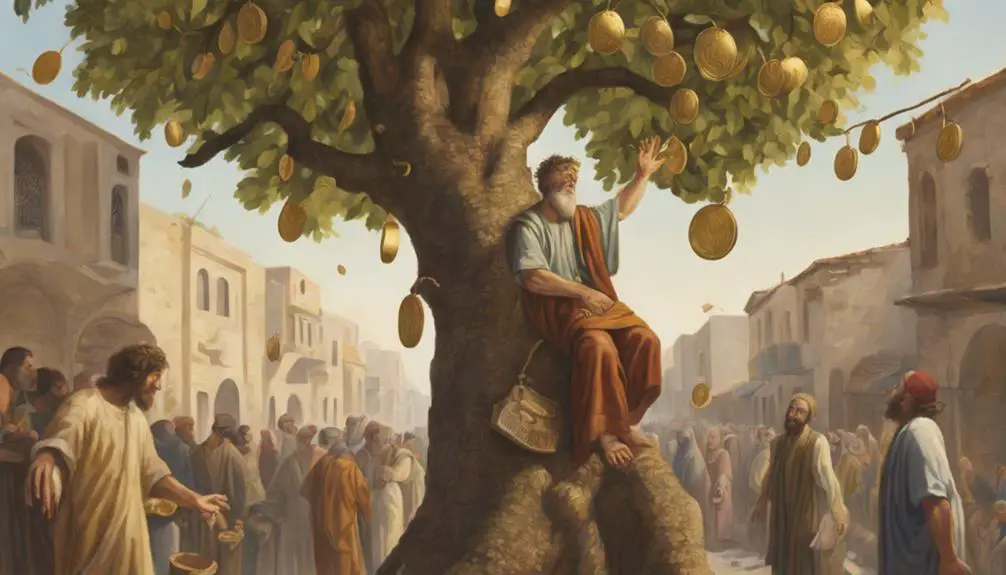
Shifting our focus to Zacchaeus, we encounter a unique type of giver, one motivated by repentance and a sincere desire for redemption. Zacchaeus' transformation was profound, as he shifted from a tax collector, notorious for their greedy and deceitful practices, to a repentant giver.
- Zacchaeus was a chief tax collector, a man considered a sinner by his contemporaries. He was materially wealthy but spiritually impoverished.
- The encounter with Jesus sparked a radical change in Zacchaeus. He was willing to give half of his possessions to the poor, signifying a complete turnaround.
- Additionally, Zacchaeus pledged to repay anyone he'd cheated four times the amount, a testament to his newfound integrity and contrition.
- This act of extraordinary generosity was indicative of a tax collector's generosity after a transformative encounter with the divine.
Zacchaeus' story vividly illustrates that a repentant heart can lead to generous giving. His transformation is a beacon of hope for all who feel entrapped in their past mistakes. This narrative underscores the power of redemption and serves as a reminder that it's never too late to change and start giving generously.
The Good Samaritan: The Compassionate Giver

While Zacchaeus showcases the power of repentance, the biblical tale of the Good Samaritan introduces us to another form of giving, one that's driven by compassion and empathy. The Samaritan's motive exploration reveals a deep sense of understanding and kindness, devoid of any self-serving intent. He acts not out of obligation, but from a place of genuine empathy and concern.
The Good Samaritan represents compassionate giving in its purest form. He sees a stranger in dire need, and he responds not just with monetary aid, but with his time and personal care. This narrative underscores the compassionate giving impact; it transcends mere financial assistance and ventures into the realm of emotional and physical support.
The Good Samaritan's actions demonstrate a profound level of generosity, illustrating that giving isn't solely about material possessions. It's about sharing one's resources, be it time, effort, or emotional support, with those who are in need. This type of giving requires a deep connection with one's fellow human beings, and a willingness to alleviate their suffering. It's an act that fosters unity, reinforces social bonds, and ultimately, reflects the love and compassion at the heart of humanity.
Barnabas: The Encourager

In the biblical narrative, Barnabas emerges as a figure who exemplifies the spirit of encouragement in his acts of giving. This man, whose name literally means 'son of encouragement', embodies the principle of 'Encouragement as Giving' in a profound way. His acts of generosity not only impacted the recipients materially but also uplifted their spirits, hence 'Barnabas' Generosity Impact'.
- Barnabas first appears in Acts 4:36-37, where he sells a field and brings the proceeds to the apostles. This act of generosity set a tone of sacrificial giving among the early Christians.
- Barnabas was instrumental in trusting and introducing Saul (later Paul) to the apostles (Acts 9:27). His encouragement helped shape Paul's significant ministry.
- In Acts 15:36-41, we see Barnabas choosing to mentor John Mark, despite his earlier abandonment, illustrating his encouraging spirit.
- Throughout his missionary journeys with Paul, Barnabas demonstrated a consistent spirit of encouragement and generosity.
From these scenes, we discern Barnabas' unique approach to giving. His generosity wasn't limited to material gifts; it extended to acts of encouragement, supporting others in their spiritual journey. This illustrates the profound impact encouragement as a form of giving can have.
The Macedonian Church: The Joyful Givers

Drawing from the narrative of the Macedonian Church in 2 Corinthians 8:1-5, you find a community of believers who exemplify joyful giving despite their deep poverty. This Macedonian Church Generosity is a paradox that's worth exploring.
Their Joyful Giving Motivation wasn't driven by abundance, but by an overflow of joy in the midst of their poverty. Their keenness to give was so profound that they begged for the privilege of sharing in the service to God's people. They didn't see giving as an obligation, but as a joyful opportunity.
Such generosity, derived not from surplus but from scarcity, challenges our societal understanding of giving. It's a testament to their faith and love for God, showing us that true generosity is intrinsic and not dependent on external circumstances.
The Macedonian Church teaches us a valuable lesson. It's not about how much we give, but the spirit in which we give. Their joyful giving was sacrificial, willing, and above all, cheerful. It was a realistic response to God's grace, a tangible expression of their deep-seated joy in Christ. Let's learn from them and seek to cultivate the same joyful, generous spirit in our own lives.
Frequently Asked Questions
How Has the Concept of Giving Evolved From the Old Testament to the New Testament?"
You'll find giving has evolved in the Bible.
In the Old Testament, sacrificial offerings were common, driven by laws and obedience.
The New Testament, however, emphasizes giving out of love and compassion.
Giving motivations shifted from obligation to genuine care for others.
This evolution shows a transition from ritualistic practices to a more personal, heartfelt approach, reflecting a broader shift in religious understanding.
What Are Some Common Characteristics Shared by the Givers in the Bible?"
In analyzing the givers in the Bible, you'll find they share common traits. Their motivations are often driven by love, faith, and obedience. They exhibit Biblical generosity, willingly giving without expecting anything in return.
This reflects a deep understanding of stewardship and the belief in sharing God's blessings. You'll notice that their giving isn't limited to material wealth but includes intangible gifts like time, talent, and wisdom.
Are There Other Significant Givers in the Bible That Were Not Mentioned in the Article?"
Yes, there are other significant givers in the Bible not mentioned in the article. You'll find that these givers' motivations often revolve around love, faith, and obedience, demonstrating the concept of Biblical generosity.
For instance, the widow who gave two mites did so out of her poverty, signifying utmost faith and obedience.
The Good Samaritan, though not explicitly stated, showed generosity through his actions of love and compassion.
How Do These Types of Givers in the Bible Relate to Modern Day Philanthropy and Charity?"
You're exploring how biblical givers' motivations relate to modern philanthropy. They're strikingly similar.
Biblical interpretations often inspire philanthropic motivations today. Many people give out of love, obedience, and compassion, mirroring biblical givers like the Good Samaritan.
They also give to support community needs, as did the early Christian community.
How Can the Lessons Learned From These Biblical Givers Be Applied in Our Daily Life?"
You can apply lessons learned from biblical givers in your daily life by understanding their motivations. It's not merely about giving, but also about the spirit behind it.
Emulating biblical generosity means giving selflessly, even when it's challenging. You're encouraged to share your resources and time, not out of obligation, but out of love and compassion.
It's about enriching others' lives, which in turn, enriches yours.
Conclusion
In conclusion, you've explored the diverse array of givers in the Bible, from Abraham's faithful offerings to Zacchaeus's repentant generosity. Each one demonstrates a unique aspect of giving, enriching our understanding of this fundamental Christian practice.
Whether it's the compassion of the Good Samaritan, the joy of the Macedonian church, or the encouragement of Barnabas, we're reminded that giving isn't just about material resources—it's about faith, love, and the building of God's Kingdom.

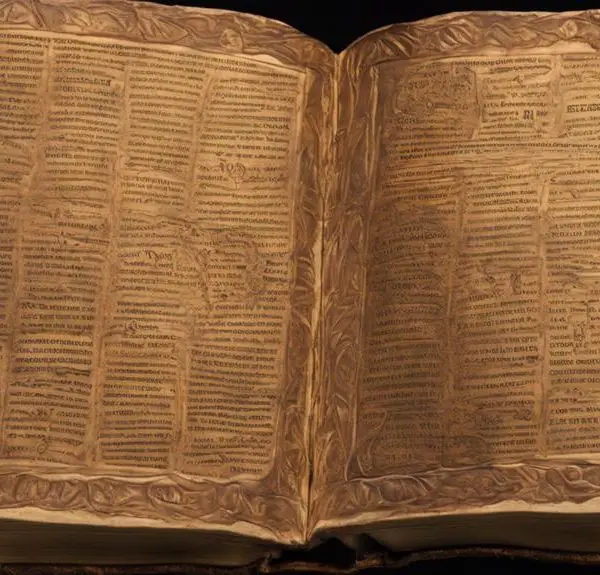

Sign up